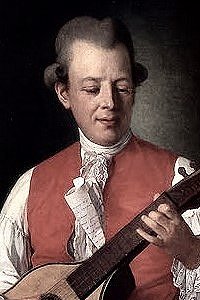Introduction

Born: February 1740, Söder, Stockholm, Sweden.
Died: February 11, 1795, of tuberculosis.
Buried: Klara Kyrkogård, Stockholm, Sweden.

Born: February 1740, Söder, Stockholm, Sweden.
Died: February 11, 1795, of tuberculosis.
Buried: Klara Kyrkogård, Stockholm, Sweden.
Known as a poet, song writer, composer and performer, Bellman is a central figure in the Swedish song tradition, and remains a powerful influence in Swedish music, as well as in Scandinavian literature, to this day.
He is best known for two collections of poems set to music: Fredman’s Songs (Fredmans Sånger) and Fredman’s Epistles (Fredmans Epistlar).
Each consists of about 70 songs. The general theme is drinking, but the songs express feelings and moods ranging from humorous to elegiac, romantic to satirical.
Bellman’s patrons included King Gustav III of Sweden, who called him the master improviser.
Bellman has been compared to Shakespeare, Beethoven, Mozart, and Hogarth, and had a gift of using baroque classical references in comic contrast to sordid drinking and prostitution, which are at once regretted and celebrated.
Bellman’s songs continue to be performed and recorded by musicians from Scandinavia and in other languages, including Italian, French, Russian and English.